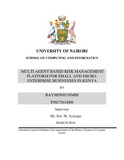| dc.description.abstract | All businesses face uncertainty and the challenge for business owners are to determine how much uncertainty to accept as they strive to grow their businesses. Uncertainty presents both risk and opportunity, with the potential to erode or enhance value. In Kenya, Small and microenterprise businesses are exposed to risks all the time and every business is subject to possible losses from unmanaged risks. Such risks can directly affect day-to-day operations, decrease revenue or increase expenses for the business. Their impact may be serious enough for the business to fail.
Currently available risk management solutions are not readily available to Small and micro-enterprise businesses in Kenya. This is partly due to their high cost, accessibility and complexity. In an attempt to solve this problem, A Multi-agent Risk Management system for SMEs in Kenya is presented in this document. The system is intended to be capable of automatically and dynamically assisting small and micro enterprises in Kenya by automatically generating business risk profiles based on business context and information provided on the business as well as dynamically providing timely advice on recommendations to mitigate business risks that would potentially affect SMEs’ sustainability through a cheaper and efficient method.
We take outstanding advantage of the following intrinsic characteristics of multi-agent systems in order to develop the proposed solution: (i) autonomy, (ii) social ability, (iii) reactivity and (iv) temporal continuity.
The results show that, increase in sales margins and profit, reduced losses and business sustainability can be achieved through a multiagent system. This is achieved by assigning agents to source business targets (objectives), perform risk assessment to identify risks inherent that would likely impact on the achievement of the identified targets (objectives), recommending required mitigating options to be applied by the SME proprietor and tracking the performance of the business targets (objectives) over time. The study recommends porting of the system into a mobile platform and piloting it in Kenya’s informal (“Jua Kali”) sector to inculcate proactive risk management in small and microenterprise business to assure their growth, profitability and sustainability. | en_US |



